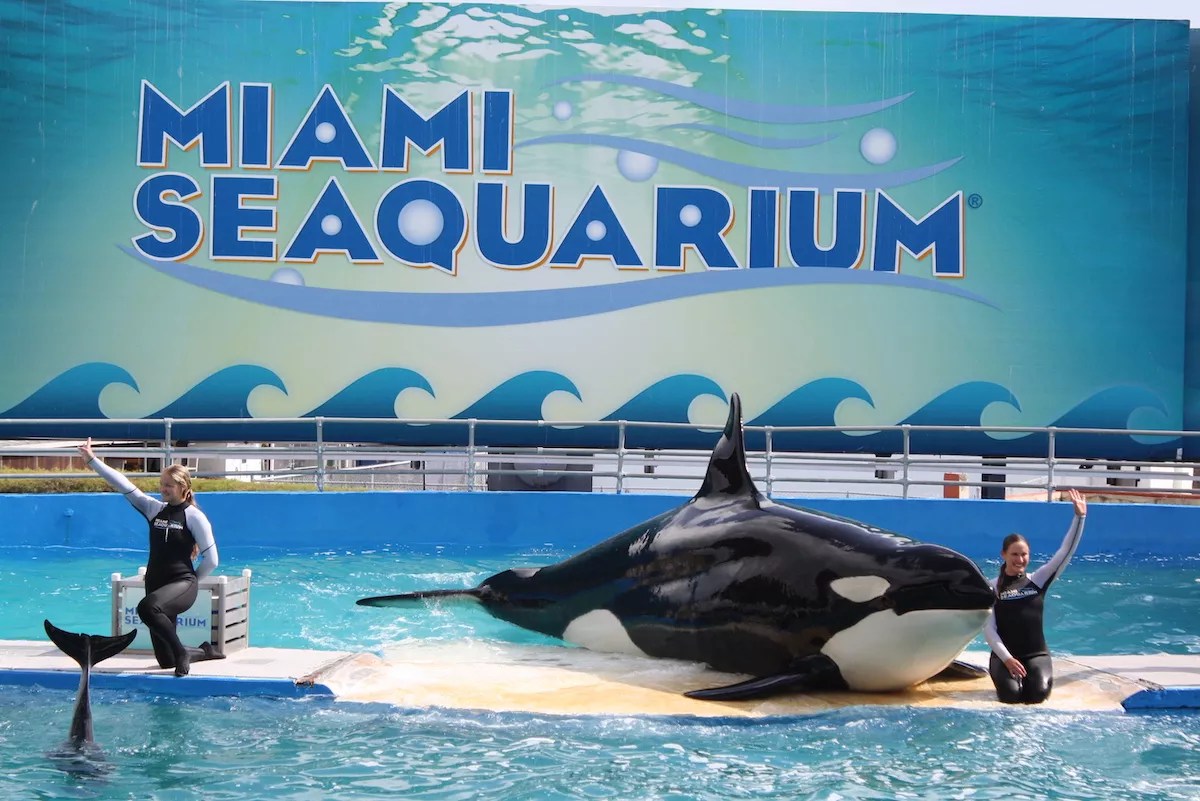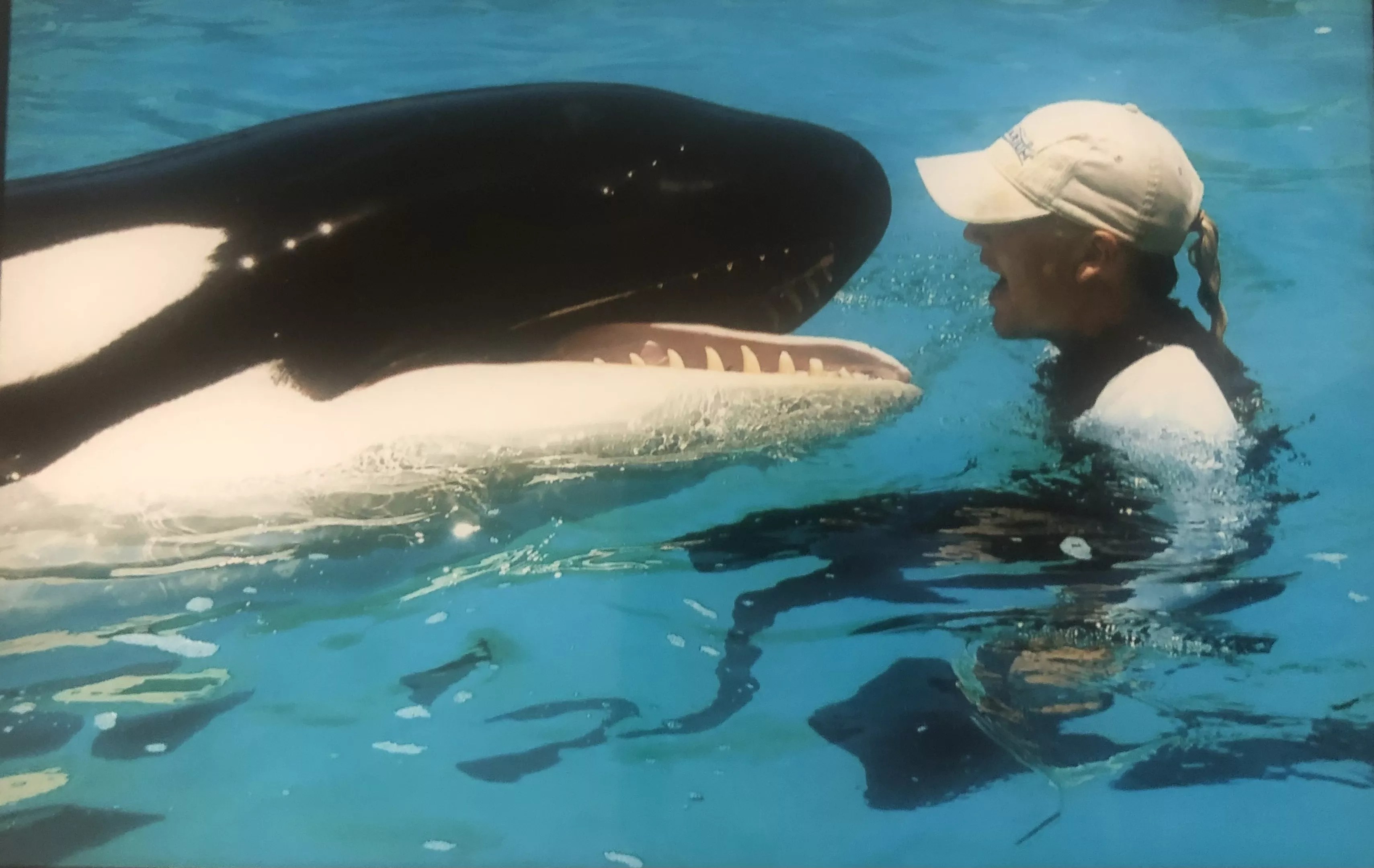
Flickr via LEONARDO DASILVA

Audio By Carbonatix
It was billed as a historic moment in Miami – in a hastily scheduled press conference held at the Intercontinental Hotel on March 30, the Miami Seaquarium revealed that it had inked a deal to return Lolita the orca to her home waters after more than 50 years in captivity.
Alongside the nonprofit group Friends of Toki, the Seaquarium told a crush of media that it planned to relocate the aging whale (also known as Tokitae or Toki) to a yet-to-be-built sanctuary in the Pacific Northwest within the next 18 to 24 months, thanks in part to a “generous financial contribution” from NFL team owner Jim Irsay. The initiative marked a major turning point in the plight of the famed killer whale, fueling hope that she could live out her final years back home in the Salish Sea, where her family is believed to reside.
However, some people who have worked closest to Lolita over the years fear the much-celebrated move could worsen her already fragile health or even kill her.
A group called Truth 4 Toki, made up of more than two dozen of Lolita’s current and former trainers, veterinarians, and caretakers, recently launched a petition to oppose the whale’s cross-country move – arguing that transporting an animal of Lolita’s age and declining health, especially after 50 years in captivity, is far too risky.
“The transportation alone is going to be absolutely terrifying for this animal,” Shanna Simpson, who worked as Lolita’s trainer at Miami Seaquarium from 2003 to 2009, tells New Times. “I don’t even think she’s going to be able to survive.”
Simpson, who now oversees the animal care department at the Topeka Zoo in Kansas, describes her six years working with Lolita as “magical.” Over time, Lolita developed a deep, unique bond with Simpson and each of the trainers; she describes the 7,000-pound orca as a smart, fun, humorous creature that thrived off consistency and disliked change in her environment, whether in the form of a new trainer, food, or song for her shows.
“When we changed our show song from Marky Mark, you know, ‘Good Vibrations,’ she was like, ‘Whoa, this is new. I’m not a fan,'” Simpson recalls.
She and other members of Truth 4 Toki believe that aside from putting her under extreme stress during the cross-country move, Lolita may not know how to function as a killer whale in a foreign environment with frigid water temperatures after more than five decades at the sun-baked Seaquarium.

Shanna Simpson (right) worked as a trainer with Lolita (left) for six years at the Miami Seaquarium.
Courtesy of Shanna Simpson
The group cites the case of Keiko (from the movie Free Willy), the first long-term captive orca to be fully released back into the ocean, who died alone in 2003 of pneumonia after failing to fully integrate with wild killer whales in his native Icelandic waters.
While the plan by Miami Seaquarium and Friends of Toki does not call for Lolita to be released into the wild, concerns about Lolita’s ability to adapt to such a new setting remain.
Simpson notes that Keiko was twice as young as Lolita.
“Do you think that if I thought [Lolita] would ride off into the sunset with her family… why would I not want that for her?” Simpson asks. “But that is just not reality.”
The online petition, created by Valerie Greene, a former SeaWorld trainer who worked with the late Tilikum, has garnered more than 6,650 signatures as of April 5. It proposes that if Lolita can no longer remain at the Miami Seaquarium, she should be moved to Shamu Stadium at SeaWorld Orlando instead.
“Jim Irsay – if you are so moved by Lolita as you claim you are, listen to us,” the petition reads. “Pay the money to get her to SeaWorld Orlando, where the experts can continue to provide the standard of care she deserves.”
It adds: “You admitted Keiko’s release was a failure – don’t make the same mistake with Toki.”
During the March 30 press conference, Irsay told the crowd that Lolita has been “near and dear” to his heart and that he was proud to play a role in finally returning her to her native Pacific Northwest.
Pritam Singh, cofounder of Friends of Toki AKA Friends of Lolita, added that his organization has already begun working with officials in Washington state, where they hope to transfer her, as well as federal agencies that must approve the move. He says the group has a meeting scheduled in D.C. this month to discuss the project.
The project to relocate Lolita to the seaside sanctuary is expected to cost at least $15 million.
“There’s a lot of work to be done,” Singh said. “But I think we’re up to the task.”
The project details, and how closely Lolita would be monitored in the sanctuary, remain scant. The Whale Sanctuary Project, a group that has advocated for Lolita’s release in conjunction with Friends of Toki, previously described a “secure and protected area within the Salish Sea,” where the whale “can thrive in her natal waters while receiving ongoing human care.”
Greene tells New Times that the project’s organizers have to be prepared for unexpected expenses tied to ongoing care for Lolita and the logistics of a move to the Pacific Northwest. She says that the initiative to release Keiko cost millions of dollars more than the anticipated outlay.
We are proud to share that the @MiamiSeaquarium has entered into a formal and binding agreement with Friends of Lolita to change Lolita’s future. pic.twitter.com/oWWvbIgkFK
— The Dolphin Company (@TheDolphinCo_) March 30, 2023
Simpson says it’s been frustrating to see businessmen and politicians – people who she notes likely haven’t spent more than a few minutes with Lolita – speaking as if they know what is best for her.
She says Truth 4 Toki plans to continue raising awareness about the potential dangers of moving Lolita from her current home in Florida.
“We want what’s best for her,” Simpson says. “We have no money in this. We have no philanthropy or tax write-offs like the millionaires do. We have nothing in this fight other than Toki – that is literally the only thing that we care about.”